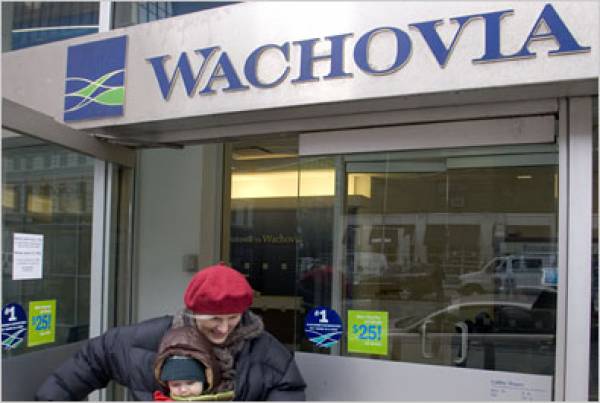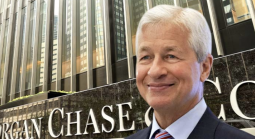Intrade Adds Wachovia to Bank Closure Options

The online predictions market - Intrade - which is based out of Dublin, Ireland and takes bets from US citizens, today added Wachovia Bank to its growing list of banks with odds of closing.
The betting market suggests there is only a 10 percent chance of Wachovia failing before December 31, 2008 compared to a 65 percent chance that Barack Obama will become the next US President or a 60 percent chance that the US economy will go into recession next year. Hardly cause for alarm...yet.
Prediction markets are speculative markets created for the purpose of making predictions. Assets are created whose final cash value is tied to a particular event (e.g., will the next US president be a Republican) or parameter (e.g., total sales next quarter). The current market prices can then be interpreted as predictions of the probability of the event or the expected value of the parameter. Prediction markets are thus structured as betting exchanges, without any risk for the bookmaker.
Steven Gjerstad (Purdue) in his paper "Risk Aversion, Beliefs, and Prediction Market Equilibrium". has shown that prediction market prices are typically very close to the mean belief of market participants if the distribution of beliefs is smooth (as with a normal distribution, for example). Justin Wolfers (Wharton) and Eric Zitzewitz (Dartmouth) have obtained similar results, and also include some analysis of prediction market data, in their paper "Interpreting Prediction Market Prices as Probabilities"
"We find that prediction markets typically provide useful (albeit sometimes biased) estimates of average beliefs about the probability of an event occurring."
Wachovia's stock plummeted as much as 20% in morning trading, after Oppenheimer analyst Meredith Whitney downgraded the bank to underperform from perform. In a statement issued Tuesday, Whitney said: "We are hard-pressed to find examples of financial companies that have successfully shrunk their businesses," Whitney wrote. "The obvious challenge is lower revenues but higher expenses ultimately deteriorate the firm's capital position."
The latest note of caution came as the government moved to reassure people their money is safe in the nation's banks.
Richard Bove at Ladenburg Thalmann looks at all the FDIC-backed institutions, comparing each bank’s bad loans to its overall assets through two ratios. First, he divides the “non-performing assets” of an institution--bad loans, late loans, foreclosed assets--by all of its outstanding loans. “A radio above 5 percent suggests danger," he told CNBC.
Wachovia was not yet in the "danger zone" based on Bove's analyses but a number of banks were, with Washington Mutual flirting in that area.
The overall industry ratio is below 2 percent. That’s good news, he points out. But it’s not so good for individual names like Downey Financial Downey Financial, Corus Bankshares Corus Bankshares, Doral Financial Doral Financial, FirstFed Financial, Oriental Financial Bell Financial Group, and BankUnited Financial.
Bank United Financial and Downey were both the most vulnerable to fail next where gamblers were concerned, though the prediction market had them at 35 percent and 30 percent, respectively.
US Bank Corp was also added to the Intrade betting options.
Some good news came out of Wachovia's home state of North Carolina. Banks in North Carolina are faring better than in many parts of the country because the state's economy is in relatively good shape, officials said on Wednesday.
The state executive in charge of regulating North Carolina banks gives the state's banks a clean bill of health. "I think there is no reason ... to be concerned, period," Joe Smith, the state banking commissioner, said in an interview with the News and Observer.
"Our banks are well-capitalized, by which I mean they have balance sheets that can withstand the current unpleasantness," Smith said. "And by the way, the unpleasantness here is not that severe, certainly in relation to the rest of the country, and in absolute terms."
The banking commission regulates the nearly 100 banks with state charters, two-thirds of about 150 banks operating in the state. The remainder, such as banking giants Bank of America and Wachovia, have federal charters or are chartered in other states.
Although the state doesn't regulate Bank of America and Wachovia, Smith pronounced them "essentially sound institutions. They are both brilliantly led, and they are going to be fine."
Wachovia will release its second quarter earnings results on July 22.
The FDIC insures accounts up to $100,000.
-----
Christopher Costigan, Gambling911.com Publisher CCostigan@CostiganMedia.com
Originally published July 16, 2008 3:32 pm EST













